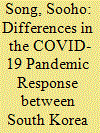|
|
|
Sort Order |
|
|
|
Items / Page
|
|
|
|
|
|
|
| Srl | Item |
| 1 |
ID:
189471


|
|
|
|
|
| Summary/Abstract |
The impact of the COVID-19 pandemic has varied across countries. Some countries controlled the virus relatively well, while others did not. In the United States, almost a million people died. However, South Korea’s death toll is only about 12,000 even though its population is about one-sixth of the United States. What caused the difference? We argue that public compliance to government direction is the primary reason. South Korea’s collective culture valuing communal benefits helped the people conform to government directions, such as mask wearing in public places. By contrast, American people resisted the government policies that restrict individual freedom due to the individualistic culture. In South Korea, historical experiences of relatively frequent national crises led to the rise of defensive nationalism, resulting in national union. However, the United States had relatively fewer national crises, and thus nationalism did not rise. Instead, national division, xenophobia, and hatred toward Asians prevailed in the United States. Besides the cultural differences, differences in national leader’s characteristics, past experiences of public health crisis, and political system also contributed to the different outcomes of the crisis.
|
|
|
|
|
|
|
|
|
|
|
|
|
|
|
|
| 2 |
ID:
179264


|
|
|
|
|
| Summary/Abstract |
Ever since the concept of soft power was introduced, there has been debate about what it is and how it works. We join the debate by studying how the success of Korean cultural products in Taiwan has improved the relationship between South Korea and Taiwan. The two countries normalized their relationship in 1948 and maintained cooperation until the severance of formal ties in 1992 because of South Korea’s rapprochement with China. Beginning in early 2000, however, South Korea’s cultural products have enjoyed great success in Taiwan. Since that time, the relationship between the two countries has significantly improved, including trade and tourism expansion, increased Taiwanese direct investment in South Korea, and policy changes by Taiwan’s government. These changes provide empirical evidence of soft power.
|
|
|
|
|
|
|
|
|
|
|
|
|
|
|
|
|
|
|
|
|